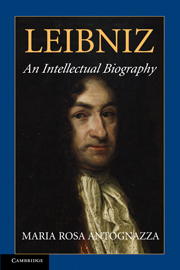Book contents
- Frontmatter
- Dedication
- Contents
- Acknowledgements
- Abbreviations
- Chronological Table
- Introduction
- PART I YOUTHFUL VOCATIONS (1646–1676)
- PART II DREAMS AND REALITY (1676–1716)
- 4 A Universal Genius as Librarian, Historian, and Mining Engineer: Hanover and Lower Saxony (December 1676–October 1687)
- 5 In the Footsteps of the Guelfs: Southern Germany, Austria, and Italy (November 1687–June 1690)
- 6 Back under the Guelf Dukes: Hanover and Wolfenbüttel (June 1690–February 1698)
- 7 Between Brother and Sister: Hanover and Berlin (February 1698–February 1705)
- 8 Light and Shadows: Hanover, Berlin, Wolfenbüttel, Vienna (February 1705–September 1714)
- 9 Epilogue: Last Years in Hanover (September 1714–November 1716)
- Appendix
- References
- Index
9 - Epilogue: Last Years in Hanover (September 1714–November 1716)
Published online by Cambridge University Press: 05 September 2014
- Frontmatter
- Dedication
- Contents
- Acknowledgements
- Abbreviations
- Chronological Table
- Introduction
- PART I YOUTHFUL VOCATIONS (1646–1676)
- PART II DREAMS AND REALITY (1676–1716)
- 4 A Universal Genius as Librarian, Historian, and Mining Engineer: Hanover and Lower Saxony (December 1676–October 1687)
- 5 In the Footsteps of the Guelfs: Southern Germany, Austria, and Italy (November 1687–June 1690)
- 6 Back under the Guelf Dukes: Hanover and Wolfenbüttel (June 1690–February 1698)
- 7 Between Brother and Sister: Hanover and Berlin (February 1698–February 1705)
- 8 Light and Shadows: Hanover, Berlin, Wolfenbüttel, Vienna (February 1705–September 1714)
- 9 Epilogue: Last Years in Hanover (September 1714–November 1716)
- Appendix
- References
- Index
Summary
Leibniz's last years were marred by frustration and loneliness. His wish to follow the new king, George I, to London and serve as historiographer of Great Britain was brutally rebuffed. First he had to produce the long-awaited Guelf history. His plans to return to Vienna or to move to Paris did not materialize. Chained to his historical task and unwilling to compromise on his high scholarly standards, he was forced to sideline researches and projects closer to his heart in a last desperate attempt to finish the Annales Imperii Occidentis Brunsvicenses. His Hanoverian stipend, suspended in October 1713 due to his unauthorized sojourn in Vienna, recommenced again only in May 1716. In the meantime, upsetting news of reduction or cancellation of his pensions came from both Berlin and Vienna. The bitter quarrel about the calculus continued unabated, eventually spiralling into a clash between competing physical and metaphysical world views: on the one hand, the Newtonian universe defended by Samuel Clarke and characterized by absolute space, gravitational force, and ready divine intervention to repair the world-mechanism; on the other hand, the Leibnizian universe in which the world-clock did not need rewinding or mending, “occult” elements were rejected, and space and time were conceived as relations. Not only did Leibniz not succeed in convincing Clarke; the support of Caroline – the only friend left him in the electoral and now royal family, who acted as intermediary in the correspondence with Clarke – seemed gradually to wane.
- Type
- Chapter
- Information
- LeibnizAn Intellectual Biography, pp. 521 - 556Publisher: Cambridge University PressPrint publication year: 2008



